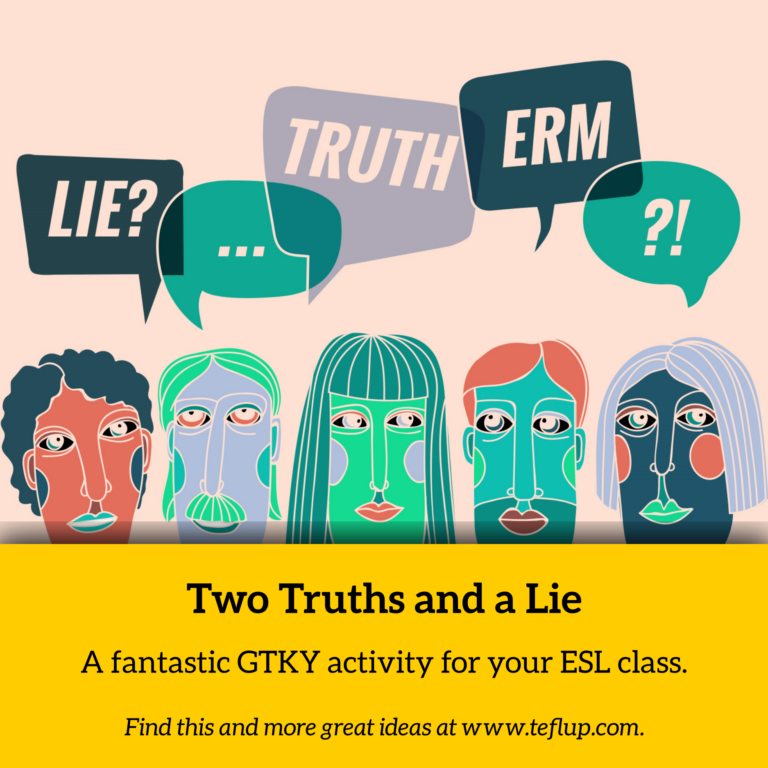For more ESL games and activities, click here.
Two Truths and a Lie
Two truths and a lie, or sometimes even three truths and a lie, is an often used icebreaker in team building sessions. However, when it comes to English teaching, it is also possible to use two truths and a lie to practise different language points. Further, it is possible to play online over zoom and other similar platforms.
- Focus: GTKY, Speaking
- Level: Elementary+
- Age: Teens/Adult
- Target Language: Any
- Time: 10 minutes - 15 minutes
- Preparation: None

Procedure:
1: Draw a cross on the board and write a sentence in three of the four segments. Tell students that two of the sentences are true and one is false. Invite students to guess the false statement. If you like, students can ask you questions to aid their guesses.
2: Tell students to write sentences about themselves. Two should be true and one false. It may help with lower levels to provide some sentence stems (such as those below).
3: With the person next to them, students should tell their partner their sentences and try to guess each other’s false statement.
4: Tell students to stand up and talk to as many people as they can, telling them their sentences and guessing the false statements.
5: Tell students to return to their seats. Invite feedback from students about what they learnt.
Example:
S1: I’m 29, I’m from Italy and my last holiday was in Spain.
S2: Hmmm, you look about 29. Maybe you aren’t from Italy.
S1: Actually, I am. Guess again.
Variations:
Online: Two truths and a lie can work online. First have students write their sentences, then put them into pairs and give them a time limit (around two minutes) to tell each other their sentences and decide which is false. After this time, move students around so that they have a new partner. This may mean that they do not get through all of their sentences with every student.
1: Students could write their sentences in relation to a particular topic to give this activity more of a language focus. For example, students could write three sentences about their family, or their most important achievements.
2: Instead of writing two or three truths, students could write two or three lies. This may be more difficult in some cultures than others, as some may be adverse to writing anything untrue. It is better not to force students in this case.
Follow on:
One obvious direction that can follow on from this activity is a discussion on lying. Some students may be against writing any lies at all, even though it is clear that this is a game. In this case you may wish to introduce them to the concept of a white lie.
Example Language:
I live… (in a house/flat/castle/bungalow)
I am a… (doctor/teacher/robot/alien)
I speak… (Mandarin/3 languages/Dothraki)
I am… (married/single)
I like/love/hate… (sailing/coffee/Marmite)
I am good/bad at… (singing/playing the piano/grammar)
My favourite food/colour/drink/band/movie is… (steak/purple/Guinness/Nirvana/Pulp Fiction)
My last holiday was… (in June/in Turkey/on a boat)
I have… (5 kids/a pet crocodile/30,000 instagram followers)
I have… (eaten a spider/climbed Everest/never watched Star Wars)
Yesterday, I was… (arrested/promoted/given an award)




